Thursday 17 June 2021 – With strong coffee at the ready, a few of the Clickify team members braved the early hours of this morning in Melbourne to join the global Elementor team and community in celebrating their 5th Birthday with their #webcreators2021 event.
Elementor is a leading WordPress website builder for professional web creators, designers, marketers, and developers.
Hosted by Mascha Kosky Sachs, Director Of Brand Marketing at Elementor, this event featured an impressive lineup of digital thinkers and web experts who shared their tips for business success and being part of the future of web creation.
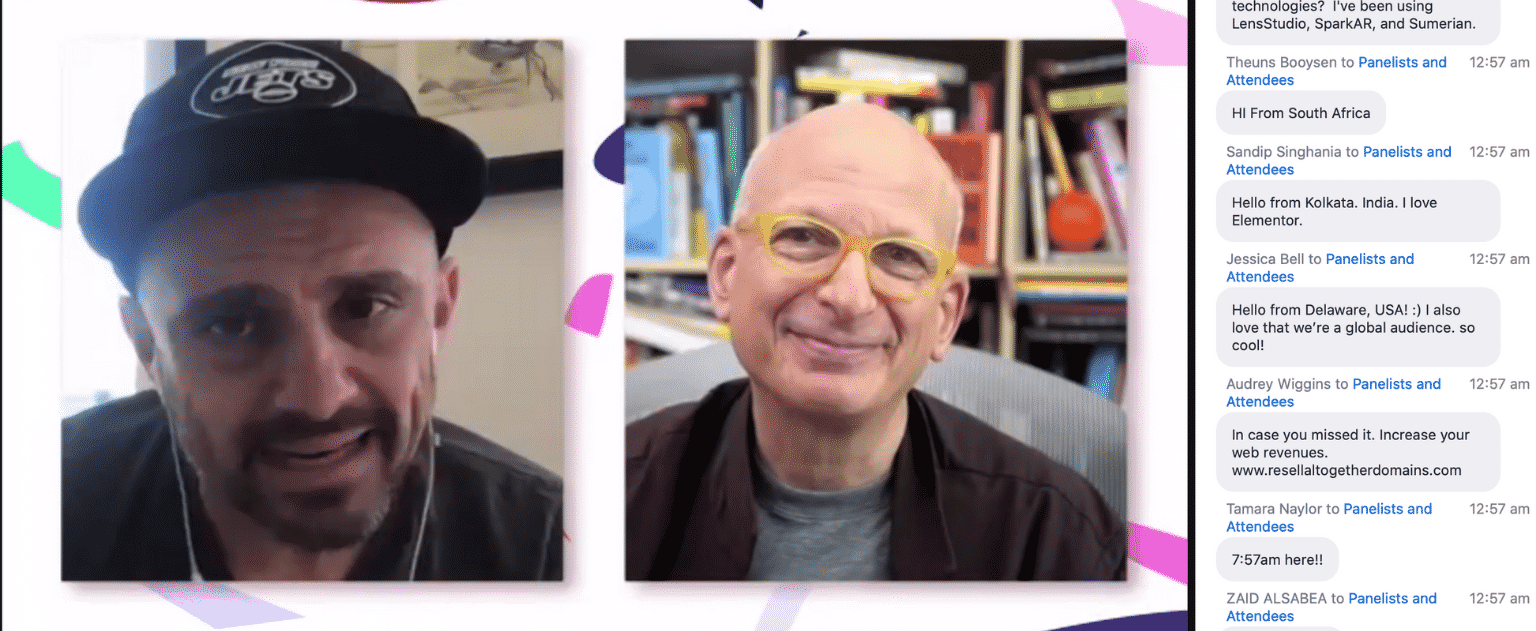
Here are Clickify’s key insights from the event that we prepared to share with our team members who weren’t able to join. We also wanted to share this on our blog for our visitors and clients who might be interested in some of the presentations.
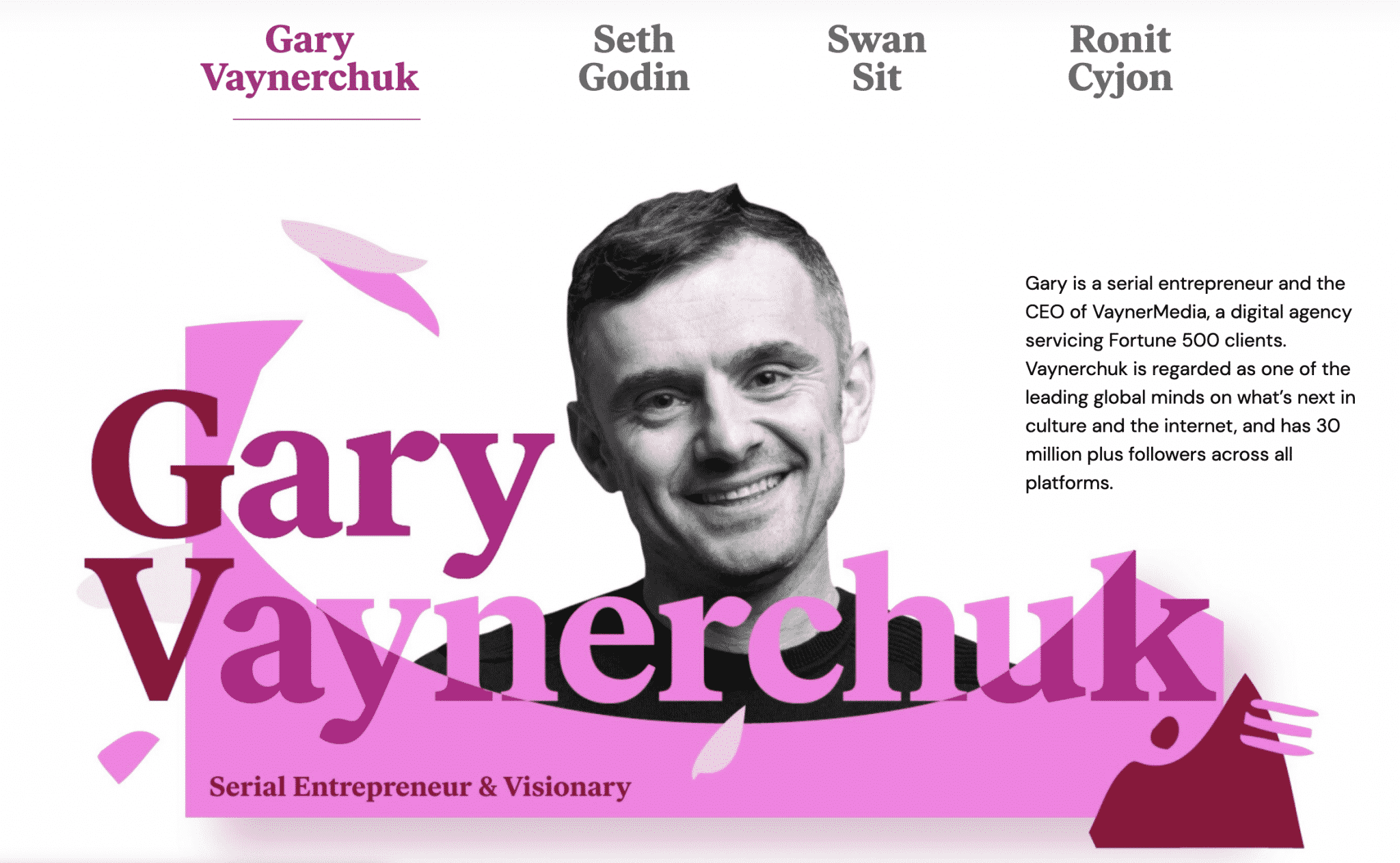
Gary Vaynerchuk
Adapt or Die: Prepare your Business for What’s Next
The world is not going backwards. Technology always wins, and the world is constantly innovating without waiting for you to catch up.
Gary Vaynerchuk is the CEO of VaynerMedia and is regarded as one of the leading global minds for what is next in culture and the internet, with 30+ million followers. He is also the author of bestselling books on entrepreneurship and social media marketing. In this presentation, Gary very passionately spoke about preparing your business for the road ahead.
Gary spoke firstly about adjusting to the reality of the consumer. He asks, “Why does it come so natural to me to deploy humility, regardless of what I’d like it to be?” Consumer behaviour shifts are real and change on daily basis. His advice: the single biggest thing is to be religious about the current behaviour of the consumer. Understand how people are behaving, analyse data on user experience, lean into intuition. Have an obsession around consumer behaviour, it is the greatest leverage.
How do I become more blindly consumer centric? How do I fight for the reality of consumer behaviour?
Web3 is brewing on the way websites interact with decentralised services. Think of it as getting an appetiser so that when it’s ready for prime time you can start to productise it.
Gary reflects on how much curiosity has been a factor in his successes.
Are you genuinely pushing yourself to learn?
Gary discusses people’s incredible passion for ‘No’ or their lack of curiosity. If you don’t question, another service provider has the option to out-innovate or commoditise what you bring to the table. He feels the next 5 years will be defined by how consumer-centric, or how curious we are to evolve our products and services, to adjust with the times.
One word Gary particularly likes is ‘Continuity‘ and he asks us to think about how we are leading and if we are an organisation focused on the retention of our team, specifically what they need and what drives them. Create good relationships with people. He provides an analogy of hunting and farming: having a good team with continuity supports success.
Gary then opened up for Q&A which he is very passionate about dedicating time to. Here were a few of the interesting questions and answers we found especially valuable:
What sort of content should you create for Social Media like TikTok and LinkedIn?
It comes down to good old fashioned supply and demand; there is more demand than what is being created. TikTok is independent creators making a real living. The content needs to bring value. He jokes that you don’t have to do a web developer gig! He then discusses how LinkedIn was a utility for getting jobs but has evolved into a meaningful content hub. If you have no audience, meaningful content helps you step forward. Be blindly consumer-centric.
Seth Godin then joins the session to ask Gary a question – “What is one thing we don’t get yet?”
Gary replies, the mix of math and intuition. You need a level of intuition and to have the humility and conviction in both the grey and the black and white. He says not to over-index the relationship between intuition and math. Surround yourself with teammates.
Is ‘done’ better than ‘perfect’ or is ‘perfect’ better than ‘done’?
Gary replies, perfect is an insecurity. People in love with perfection are using it as a reason to judge or be judged and to create leverage that they are perfect. Gary is a big fan of ‘done’!
What is the most important post-COVID trend?
To eliminate friction. Push people to create experiences that eliminate friction. Lack of friction is a huge consumer want.
What is the best way to get leads with a low budget for marketing?
LinkedIn and organic content will blow you away. You can have no followers and you will be shocked at how many leads come from good content, just keep chipping away at it.
What are 3 recommendations to better understand consumers?
Listen, listen, listen. Instagram, Reddit and Discord and explore these platforms and trending topics. Use hashtags, look at trending topics, spend time in communities. Join Facebook groups. Subject matter ones. Join small business groups.
Any tips for getting through the hardest part, the grind?
I enjoy the grind. Running a business is like playing golf or sailing (these might be hobbies for others!) I like the hard parts as well as the accomplishments. I love my process. You have to ask yourself if you do it for money or if it is because you like it so much. You then figure out the grind part. People value money too much. Value success too much. Put Business in its place: it’s not the most important thing in the world. Put in perspective.
What was a moment that almost had you quit and how did you get over it?
Never had that moment. I’m fortunate. I have had challenges or ‘micro quitting’ that I’ve stopped, shut down companies, sometimes I fail and I’m ok with that. I liked it so much and persevered.
How can I keep my Social Media content hot?
Don’t worry about competition. The simplest way is to be authentically you. Show all parts. I show that I’m a jets fan and also talk about wine. You are a web developer but you are also many other things. People don’t show enough of themselves.
How do you discover new consumer trends?
I just listen. I spend all my time looking at what consumers are doing on social platforms. I am a loudmouth but I’m listening more than I’m talking. I spend time in communities and observing beliefs.
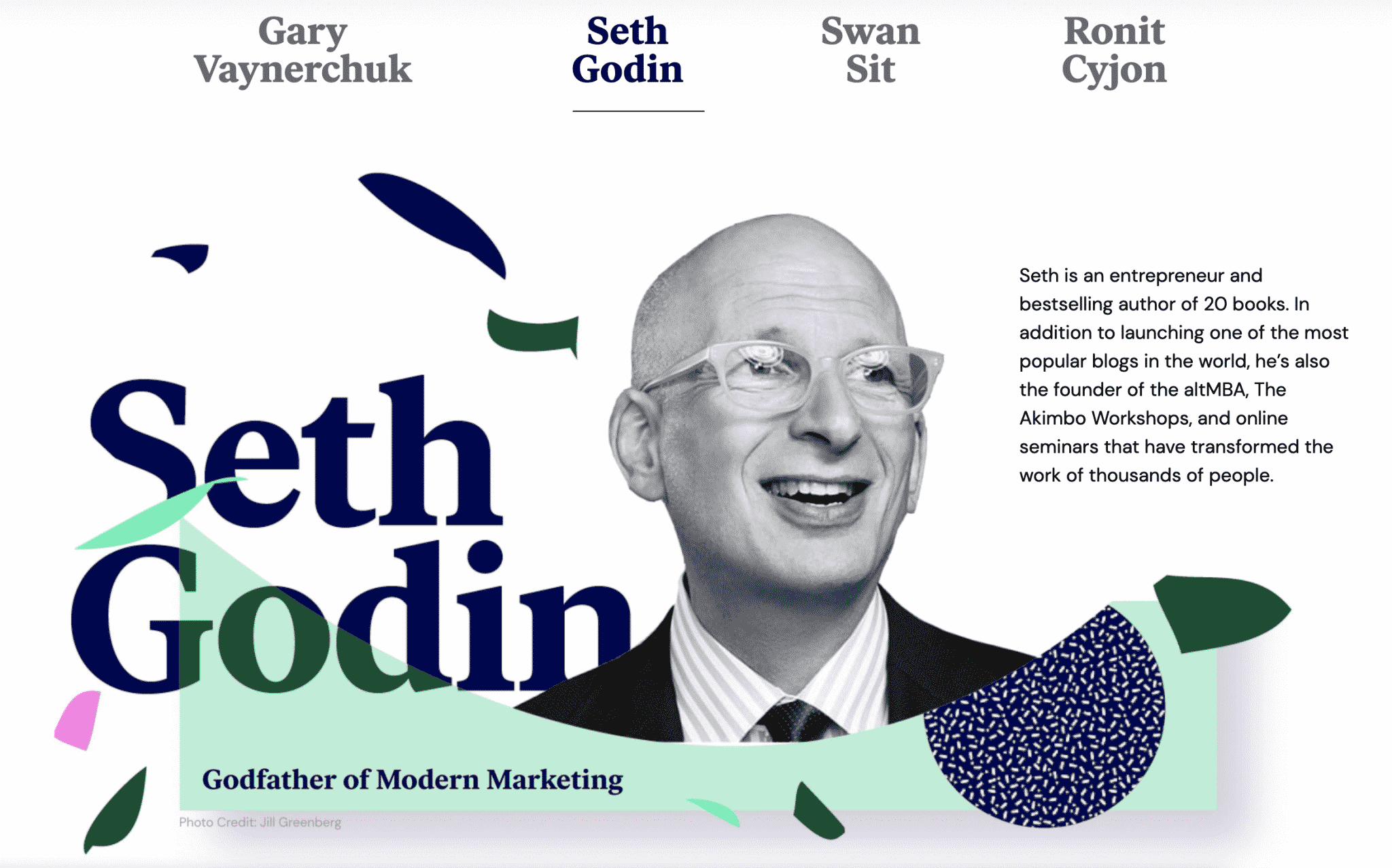
Seth Godin
Must-Have Skills for Independent Creators
People think that making a living as a professional web creator involves things like full-stack coding, knowledge of CSS etc. Those are a GIVEN. What actually matters are the soft skills. Things like empathy, awareness of genre, resilience, etc.
Seth Godin almost needs no introduction. He is known as the ‘Godfather of Modern Marketing’, best-selling author of 20 books, and has one of the most popular blogs, which the Clickify team are avid readers of.
Seth says he has five big ideas he wants to share:
1. Are you a Freelancer or Entrepreneur?
Seth classifies himself as a freelancer, he gets paid when he works. Entrepreneurs are different. They build something bigger than themselves. Your job is not to do the work.
2. Choose your customers, choose your future.
You can’t have all the customers, you have limited staff. You can’t have everyone. The customers you choose are the ones that can determine what your day will be like. Make a choice. Am I proud to work for this person? Am I complaining about my client? Am I attracting good clients? You get great customers by getting rid of bad customers. Use that space to attract a great customer.
3. The smallest viable audience.
How do I get more people? You are proudly in a niche. Fewer than 2% of the country have read Seth’s book. It’s not for 98% of that population. It puts me on the hook, I made this for you. Embrace the idea.
4. What will I tell the others
Your idea, your business, your site won’t spread cause people care about you. It’s not because you spent a lot of money. The people who hired you tell other people. How did you find out about Twitter? Was it their sponsorship of the World Cup? It wasn’t for hustling attention. People who used it told other people because it will help them. It will spread cause people choose to talk about it.
5. What do you make?
This is not how much money. You are a marketer, you are here do to do work. We make a change happen. We turn non-customers into customers. Harley Davidson, at their peak they made a chance for a group of people, disrespected outsiders, and made them feel like insiders. What did Apple do at its peak? Talked to a group of people who have good taste about digital interaction. They could raise the standard of how people engaged, once they had better taste, they’re more likely to tell the others.
6. Who do you want your customers to become?
If you race to the bottom, you might win. Don’t race to the bottom. You have a chance to race to the top. It’s thrilling. Be one of a few.
Narrate for a group of people who are connected. People who might want your leadership. Everything you do that touches the market is marketing.
How do we deal with clients that don’t agree with the way we want to treat the people we are seeking to serve? And the answer is, you should say no.
Practical empathy, understanding of the people who visit the website you built, don’t know what you know. They haven’t seen what you’ve seen, they don’t understand what you understand.
Stop being a commodity provider of commodity web creation. I beg you to stop saying, “I’m for everybody, and I’m a lot like those folks but maybe a little cheaper because low price”.
In this moment, this revolutionary moment, the perfect is being destroyed and the impossible is being created. We have a chance to stand for something for change for justice for fairness for dignity for the benefit of the doubt.
So when you feel like you’re just a cog in the system, or that it’s getting too tricky because the technology keeps changing too fast just go outside and look up in the sky and realise there are footprints on the moon. Because what this means to me is that, of course, you can succeed. But what you actually have is a chance to matter.
Seth then opens up to a Q&A. Here are a few of the interesting questions and answers we thought we’d include:
Where is marketing going?
The next big thing arrived 25 years ago. We can reach other people for free, if they want us to, at scale. That changes everything.
This helps you understand social media through to the unrest in the world. You can reach the people who want to hear from you, when they want to, for free, at scale.
I have a brand, I get good sales when I run paid ads, they refer to their friends too, but once I stopped the ads, it shuts my business. Are there any organic ways, or good ideas to grow our brand?
Brand is not a logo. No one cares about your logo.
A brand is a promise. It is an expectation when I hire you. Advertising is amazing when it works, a self-directed exchange of money for attention. If it pays for itself, do it more. If you buy ads and you make money doing so, keep doing it until it stops working because it’s not unethical to do so. There are businesses that have been built really powerfully with that simple economic measure.
On the other hand, if you can’t measure it, or it’s not working, and then the defect is your pricing or the thing you’re offering is too easily replaced or you don’t stand for enough for a small enough group.
For people who believed blank. And who want blank. Hiring us will get you blank.
The key is to obsess about the first part of this statement so that you can show up in the right place at the right time with the right message.
Do you think there’s ever a time to give up? If yes, when it’s difficult to know when it’s better to fight or let go of your dream.
I’m a huge fan of quitting. Quitting is a virtue. My friend Danny Duke says “You know you’re doing it right when you feel like you quit a little too soon.” Don’t start something if you’re not willing to get to the other side. That’s the first rule, and number two is when it gets really, really hard remind yourself that you knew it was going to get really, really hard, so you can get to the other side. But if you are doing something where very few people get through the dip, quit right now, and use the resources you’re freeing up to get great at something where you can get great at it. You need to become a meaningful specific.
What is your position in working with Social Media Influencers to boost your brand?
There’s a paradox in paying for somebody to profess affection for what you do. Similar to the paradox of paying to have somebody go on a date with you – in many places that’s against the law. It’s this weird imbalance. There are definitely people who have pulled off the social influencer dance. Eventually, it wears out because their followers realise it’s just going to the highest bidder. And the highest bidder is usually somebody who makes average stuff for average people. So, it’s a fine line, it can be walked, but go in with your eyes open. The easier it is to buy someone’s endorsement, the less the endorsement is worth.
I want to know if trends are worth following, I believe authenticity, creativity, and transparency are essential to creating bonds with customers, what are your thoughts?
No one cares about authenticity, it is overrated. You want consistency. Not authenticity.
Most trends are overrated. The next big thing was going to be augmented reality and virtual reality for the last 15 years. Every once in a while, a trend shows up that’s real. And the question you need to ask yourself is what is the penalty for waiting a little bit?
If you could state in two or three sentences; what is the most important life lesson you have learned from your time on Earth, what would that be?
Seth encourages listeners to read the book called The Art of Possibility. We all have insight and we all have skill and care and health and energy. We owe it to the people around us, to make things better and to treat other people with dignity and respect. Challenge yourself not to settle.
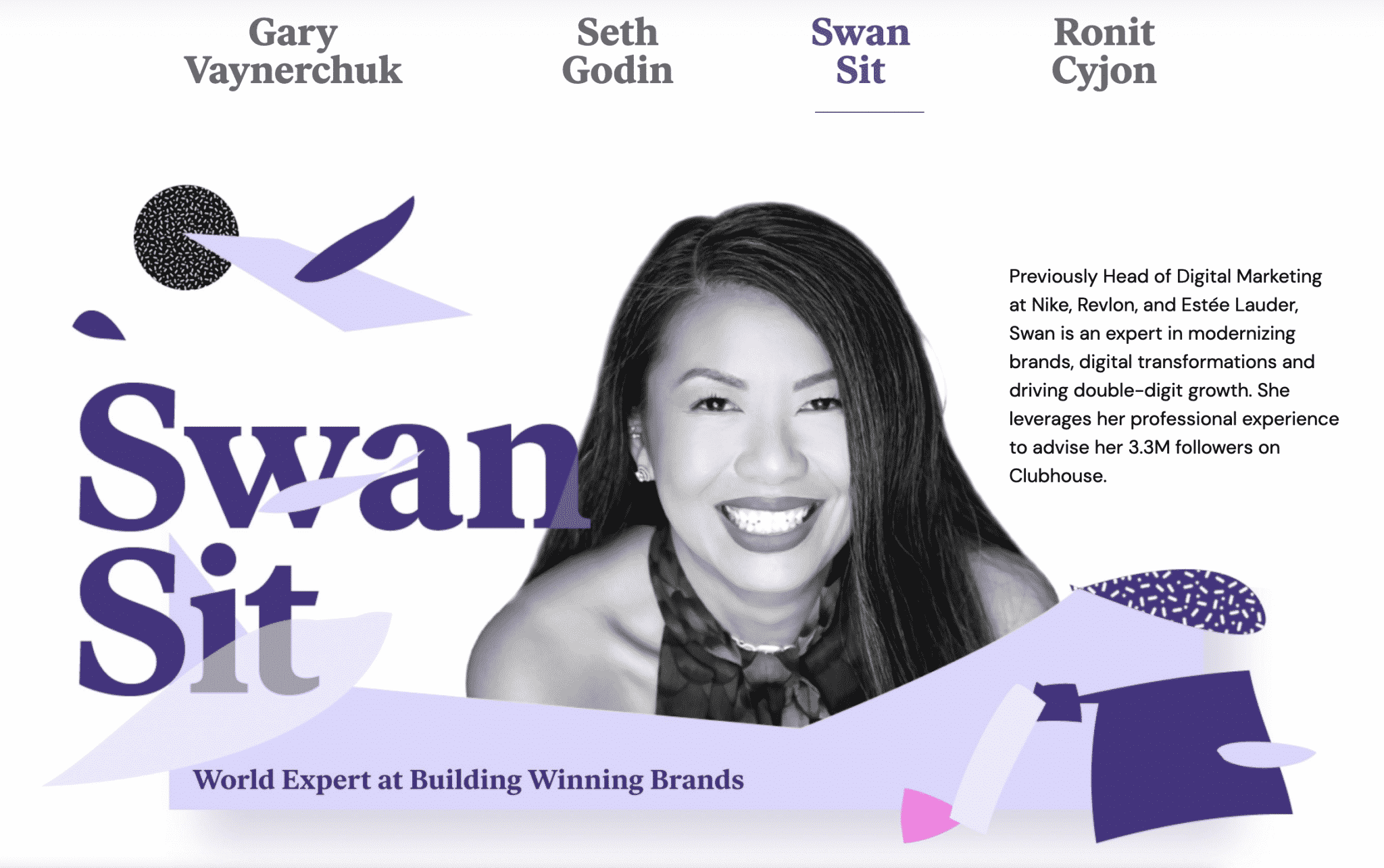
Swan Sit
Big Brand Secrets Every Web Creator Should Know
Swan Sit leads digital marketing efforts globally for Fortune 500 companies like Estée Lauder, Revlon, and Nike. She is an expert in digital, marketing and strategy. In this session, she very openly shared lessons she has learned from her work and ideas you can take advantage of to grow your own brand and business.
- The Power of Differentiation – Be different but make it count. Don’t be different just for difference sake. Be different where it matters. When a brand starts behaving like a person, you bring the humanity and the connection back. Work with clients to build digital experiences. You might be the technical solution to what they are building, but you’re also so much more. Think about the inspiration you can give them by understanding modern consumers and what technology can do, and what an entire experience could look like.
- Future of Data – We’ve heard about ‘Digital Transformation‘ for two decades. You build experiences every day in the digital space. You want the fewest clicks to purchase, if someone has to click multiple times before they buy something you might lose them. If they click twice they might actually convert. How can we use data to make those viewers click to purchase? You have to know who the customer is. The future is data, because we don’t know who the consumer is, there’s no chance of serving up to them these experiences that not only get them to convert faster but that also makes them feel seen and recognised and understood by your brain. You built a website, where does this fit into the customer journey?
- Redefinition of Community – It comes in all shapes and sizes. Too often we reduce community to Social Media. It’s much more than that. This can be consumers of a brand, a community of peers, and even competitors. The definition of community is evolving dramatically. Intersection between commonality of purpose and frequency of touch. You have to care about the same thing and interact enough to make it a community, make it count as a regular part of your life. This year has taught us, we should be coming into this world with a mindset of abundance not scarcity. There is so much opportunity out there, we can do more by partnering and building together. Think about how you can actually galvanise a community where one plus one can equal three. As you think about the experiences that you build for clients and brands and companies, how do you get them to think about community differently? It’s an affinity between a group of people who feel connected and it’s what we’re all struggling for today. You can be thought partners and educators and inspiration for your clients.
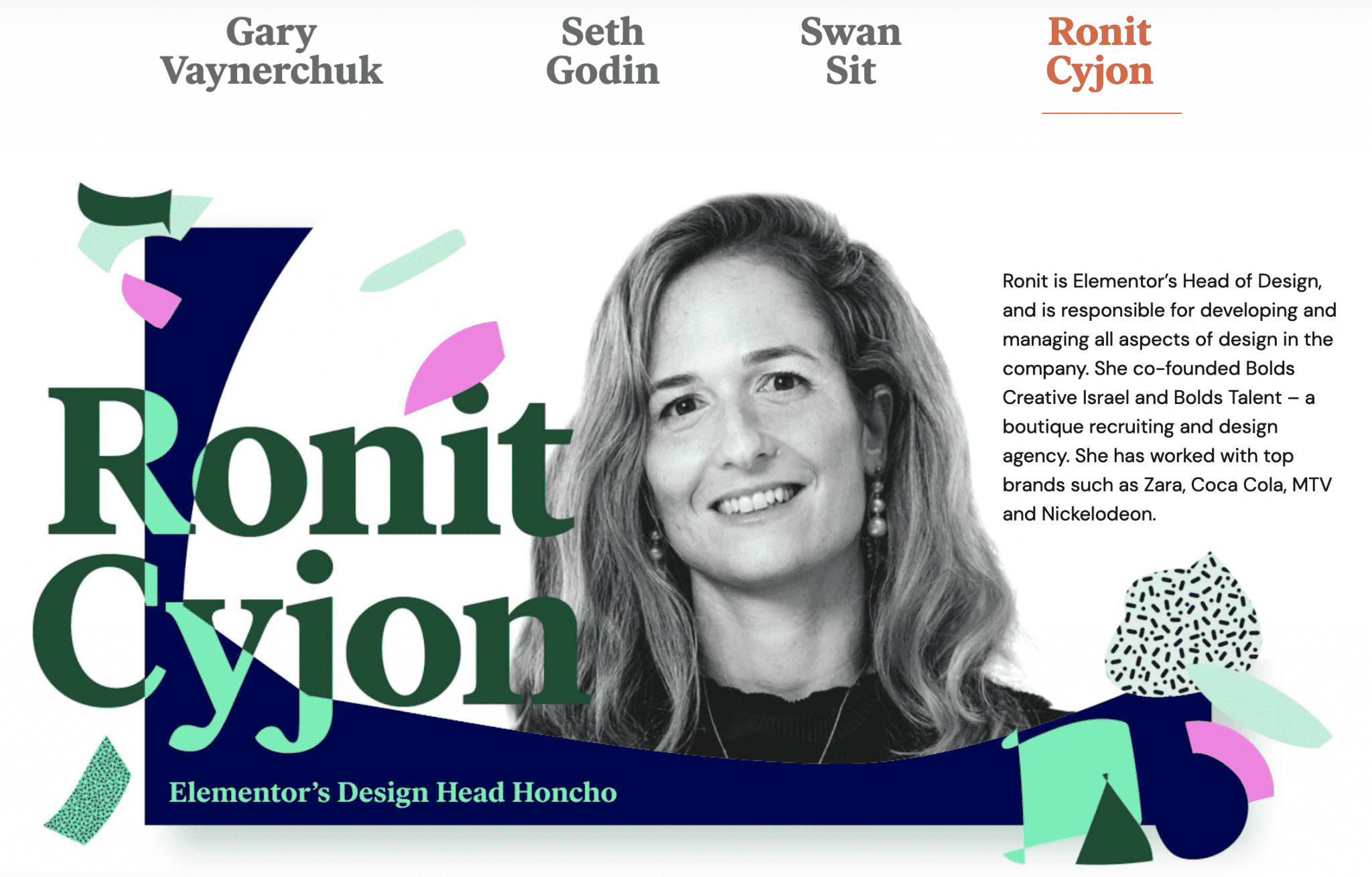
Ronit Cyjon
Redesigning a Site for 8m+ Users
This session was focused on how the Elementor design team led the redesign of their site, using a unique design process and system and balancing business goals and design freedom and the challenges and successes along the way.
Ronit Cyjon commenced the session by talking about how a website should tell a story. They recently redesigned their site. For the last 5 years, they focussed on the product and it’s now become a full-blown platform. There is the product, the resources, and the community. Always think of your audience. Design with them in mind. A website should be a living organism. Transform as quickly as you can as things change, always listen and react to your users. Give power to our web creators to grow their business faster. Be consistent visually and conceptually. Blur the line between the physical and virtual world.
Erez Eden, Product Lead, then spoke about taking design to development. They came up to 20+ pages heavy with content and design, which they put in a process. They get a brief for each page from their product marketing team. They provide them with information and messaging. They then take to UX and do a couple of iterations for wireframing; they then have the copy enter. Then the UI, layout, video then we head off to development and there are a couple of cycles of QA and then it’s ready to go to production. They wanted to go live by Elementor’s birthday. They always want to iterate endlessly but tag it as done. We need to move forward. When it’s good, it’s done. If we are talking about how to bring an audience to a website, of course, there are campaigns. They redesign each page with their SEO team, incorporating search terms. They needed a good structure for each page. Important to have a clear topic for the page and sub-page for search engines. Tell them a compelling story. Content writers and designers work together to create an authentic story. Prompt your audience to do something. Call to action buttons.
Ronit then spoke about how you should think of creating like a muscle. Practice to get better. Set time aside. Create a safe environment, no judgement, just good feedback. Creation for the sake of creation. Give the most creative wide brief. Everyone needs a good trigger or framework to work with to focus on creativity.
Mascha then signed off the event by saying it was a fantastic celebration of all things web and we agree.
If you want to know more about the event, check out the #webcreators2021 on Twitter.
